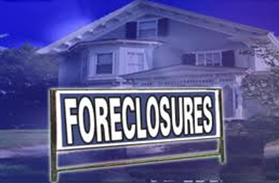
By Miriam Raftery
August 4, 2020 (San Diego) – Five months into the COVID-19 crisis, many Americans still remain jobless, with millions of businesses shut down or operating at reduced revenues. Unemployment benefits and stimulus check funds are running out for many who are struggling to pay their mortgages. Bills to provide long-term protection against foreclosure due to the pandemic have thus far stalled in Congress and the California Legislature, though a revised bill in Sacramento still offers hope for some.
A measure to protect some commercial property holders is also in the works, such as hotels, retail, apartments/condominiums, industrial and commercial offices.
But will these measures win passage in time to prevent mass foreclosures, if they are enacted at all? The federal CARES ACT in March temporarily halted foreclosures for nonpayment due to COVID-19 on federally backed home loans, an action Congress extended short term until August 31. Many other property owners have had no protections at all. On July 31, the $600 a week extra unemployment benefit also ended, putting more Americans in dire straits.
Advocates say impacted consumers and business owners should let their legislators know of their needs. Among our local legislators, some have been supportive and one is a coauthor of Congressional legislation. But others have been tone deaf, including an East County legislative representative who voted against mortgage relief for homeowners.
The problem
 The temporary federal protections gave homeowners forbearance, meaning a delay in in paying missed payments. Initially this was for three months, then six, unless they can negotiate another arrangement with their lender after the August 31 deadline. For non-federally backed loans, there is no such protection, though some lenders have voluntarily worked with customers.
The temporary federal protections gave homeowners forbearance, meaning a delay in in paying missed payments. Initially this was for three months, then six, unless they can negotiate another arrangement with their lender after the August 31 deadline. For non-federally backed loans, there is no such protection, though some lenders have voluntarily worked with customers.
Congress has already extended the deadline once, which initially ran out June 1st. But the longer the pandemic runs on and the more payments that are missed, the less likely it is that a homeowner would be able to afford a balloon payment. While refinancing at lower interest rates could be an option for some, for others still without income, even this may not be enough.
Some consumer advocates are calling instead for legislation that would mandate deferral of payments to the end of the mortgage. So a 30 year mortgage might become 31 years, if a person missed a year of payments, for example. But the lending industry has fought against deferrals tooth and nail.
According to the Federal Housing Finance Agency’s latest available data, the number of initiated forbearance plans leaped from 165,431 in March to 989,594 in April. The Enterprises Foreclosure Prevention Actions completed 16,738 foreclosure prevention actions in April alone, of which just 19 percent were modifications with principal forbearance. Around 3.5% of all mortgages were delinquent by 30-59 days as of the end of April.
Henri LeBlanc, an East County homeowner, recently lost his job at a local university and hasn’t found new employment due to the pandemic and schools being closed. Unemployment insurance, even when combined with the one-time $1200 stimulus payment, hasn’t been enough to make up for his substantial lost income.
“My mortgage company, PNC, has simply extended my forbearance another three months. I’m in the fourth month,” he told ECM. “I asked them if they could just defer my payments – tack them onto the end of my mortgage – and they just said, `Let’s visit that at the end of your forbearance. That’ll be six months,” says LeBlanc, who fears foreclosure since he has no way to make a balloon payment after months of missed payments.
Also hard hit are landlords. While eviction moratoriums, such as those provided by California and many local cities, have protected many renters from winding up on the streets, landlords have received no such protections against foreclosure when their tenants don’t pay the rents.
“Why is it okay for our Governor to exempt renters from paying?” asks Jon Videozz, an East County resident who fears foreclosure, since as a landlord with a rental property, he still has to pay insurance payments and other costs. “Between the 10 pay cut for our state workers and lost rent, I’m at minus $2,000 per month,” he says, adding that he also has two grown children now living at his home. He adds, "All the bills in Sacramento will provide no immediate help for landlords. Unfortunately I need the money now and can't keep it going without. The fact is many tenants will just walk away without paying once it comes time for evictions. we can't do that or we lose everything we have worked for. Unfortunately many people believe we are all rich millionaires with the money to support others. "
The state of California is taking away our property rights
Foreclosure is also a serious concern for owners of commercial properties, from small businesses to hotels.
Legislative efforts
“Foreclosures and evictions are the other shoe waiting to drop in this economic crisis caused by the pandemic,,” says Congresswoman Susan Davis, who cosponsored the Ensuring HOMES Act to give homeowners flexibility when paying back missed mortgages. “It has also been more than two months since the House passed the Heroes Act, which included $175 billion to help renters and homeowners make monthly rent, mortgage, and utility payments. Yet this bill is being blocked in the Senate by leader [Mitch] McConnell.” While she added that she is glad the White House and Congressional Republicans are now at the negotiating table to discuss a potential new round of economic relief, she adds, “We cannot leave renters and homeowners behind as Congress crafts another bill to help the American people weather this pandemic.”
 Congresswoman Davis (photo, left) also supported the Emergency Housing Protections and Relief Act of 2020, or HR 6492.
Congresswoman Davis (photo, left) also supported the Emergency Housing Protections and Relief Act of 2020, or HR 6492.
This federal bill, which passed the House but has stalled in the Republican-controlled Senate, would extend the moratorium on foreclosures on federally-backed mortgages until September 30 and also extend eviction moratoriums for renters – protecting both renters and landlords, as well as homeowners. It would also create assistance funds to help homeowners and renters cover mortgage payments, rent and utilities and more.
But consultants on Capitol Hill concede privately that the bill has little chance of making it through the more conservative Senate, which has thus far failed even to extend unemployment benefits or provide additional stimulus funds.
“They’re as useless as whiskers on a watermelon,” a Julian homeowner says of the U.S. Senate on foreclosure actions. The homeowner, who says her lender threatened her with foreclosure if she spoke to media, has asked that her name not be published. She says she has made over 300 calls to local, state and federal legislators in an effort to get mortgage protections passed. For now, she’s negotiated temporary payment delays with her lender, but doesn’t know what will happen long-term.
The Senate may, however, take up measures to protect commercial property owners, under heavy lobbying pressure from key industries.
A more likely source of relief for some California homeowners may come from the state Legislature. Assembly Bill 2501 would have provided only temporary forbearance from foreclosure for up to one year, not deferral to the end of the loan. It would also have protected consumers with vehicle loans or payday lender debts, in addition to mortgage holders. It would also have protected a multifamily property owner for up to one year, at which time the borrower would owe the money or have to negotiate a payment plan with their lender.
But the bill failed passage on the Assembly floor Among local legislators, Assembly members Todd Gloria, Lorena Gonzalez, and Shirley Weber voted in favor.
 Assemblymembers Randy Voepel (photo, right) and Marie Waldron, whose districts include much of East County, voted against it. Assemblymembers Boerner Horvath and Brian Maienschein did not vote.
Assemblymembers Randy Voepel (photo, right) and Marie Waldron, whose districts include much of East County, voted against it. Assemblymembers Boerner Horvath and Brian Maienschein did not vote.
The Julian resident fumed upon learning of Voepel’s no vote. “I spent 45 minutes on the phone with Voepel’s staff. I’ve called many times. I actually cried, because I was telling them `People are losing their homes. What do I do? They said they were sympathetic. Sympathetic to who? The bankers?”
A video of the hearing reveals that several members switched their votes after the voting began---actions that a capitol insider in Sacramento told ECM, on background, was due to heavy lobbying by the banking industry including credit unions.
But hope remains. The bill’s author, Assemblymember Monique Limon, has just introduced amendments intro AB 1436 that include mortgage forbearance provisions similar to those in AB 2501.
If you wish to contact your state Assembly members to ask them to take action on AB 1436 or share your concerns on the need for other mortgage protection measures, you can find a list of San Diego County’s state legislative members, as well as our Congressional members, in our Citizens Action Center: https://www.eastcountymagazine.org/0809soundoff
Commercial property relief proposed
Meanwhile in Congress, on Wednesday, H.R. 7809, the HOPE Act, which stands for Helping Open Properties Endeavor, was introduced by Texas Congressman Van Taylor with bipartisan support. It would provide financial assistance for commercial mortgage holders impacted by the pandemic. The measure, if enacted, would help those impacted by the pandemic in the hotel, retail, multi-family housing, industrial and commercial property markets. Providing mortgage help for these industries also aims to save jobs; the hotel industry alone provides 8.3 million jobs nationwide, while retailers directly support 29 million American jobs, according to the bill’s author. Text can be found here and a summary of the bill can be found here.
WHAT TO DO IF YOU'RE FACING FORECLOSURE
 Negotiate delayed payments. Contact your lender immediately to ask for deferral of missed payments to the end of the loan if possible, or alternatively a temporary deferral and revised terms. Don’t wait – or you’re more apt to face foreclosure.
Negotiate delayed payments. Contact your lender immediately to ask for deferral of missed payments to the end of the loan if possible, or alternatively a temporary deferral and revised terms. Don’t wait – or you’re more apt to face foreclosure.
Some lenders are going beyond what the law requires – but generally only if you let them know before you fall far behind on payments.
Martin Sanchez, mortgage outreach manager for Wells Fargo in California, says that for its mortgage borrowers facing financial challenges due to COVID-19, “We are making sure that the resources are available so that they are able to stay in their home. That is the goal…. “The most important thing is we encourage our mortgage customers to reach out to us directly.”
One way of staying in your home that Wells Fargo offers is a suspension of payments for 90 days, with a revaluation every 90 days, up to a maximum of one year, Sanchez says. “Once the situation has gotten better for them, whether it’s one month or one year, we have options for them. One indeed is to put the total amount due at the end of the loan; that is an option for most customers.”
Another options is to pay down the full amount due. Or for those still facing financial challenges, another option could be a loan modification such as changing the terms of the loan or interest rates.
He adds, “That is for loans that we service – federal loans, but we also have our own portfolio loans, either for ourselves and other investors…Those also have similar protections (at Wells), forbearance and payment suspension
Refinance your home
“Refinancing is another option. We are at historic low rates,” says Sanchez.
For some, refinancing could mean reduced payments extended over a longer time, for example. During a prior historic drop in interest rates, this journalist was able to refinance and save hundreds of dollars a month on payments, since interest rates were high when the home was initially purchased.
Sell your home
One bright spot is that San Diego’s home sales market remains strong despite the pandemic, due to a continued shortage of housing inventory. That may not be the case in the future, so now might be the best time to sell your home if you’re not sure you can meet future payments, especially if you have significant equity in your home after years of making payments.
“The market is crazy hot, if you’re selling your house,” realtor Fabrice Borel at Berkshire Hathaway home services in told ECM when asked about home sales in East County. But that doesn’t apply to condominiums, he added. He said that on sales of single family homes, he is receiving “up to 30 offers per listing and houses are selling way above the asking price.”
Several other real estate professionals and property sellers also confirmed to ECM that it’s common right now to see multiple offers, some above asking prices on homes.
Alan Nevin, Director of Economic and Market Research Group at Xpera Group in San Diego, offers this advice. “If you wanted to sell your house, this is a very good time to do so, because the Realtors are desperate for product to sell.” But he adds,”Unless you are really desperate, I would not sell your home right now.”
Ask your legislators to take action
The squeaky wheel gets the grease, as the saying goes. Too often state and federal legislators only hear from industry lobbyists, in this case, the banking industry. Ask them to take action to prevent foreclosures and provide meaningful help for you, whether you’re a homeowner, business owner, or landlord facing foreclosure.
Our Citizens Action Center lists contact information for San Diego County’s state legislative and Congressional representatives, as well as some local officials at https://www.eastcountymagazine.org/0809soundoff.
Check our COVID-19 local resources center for help: https://www.eastcountymagazine.org/local-covid-19-resources-center 
You may qualify for local aid from San Diego County, if you're in an unincorporated area, or from the local city where you live. Some are offering grants for local business owenrs, for example, or payments to help renters or those who need help to pay utility bills. You may also qualify for other forms of assistance such as free food, reduced utility payments, lower insurance payments, and more. There are some targeted grant programs to help specific groups such as immigrants, people in the arts field, or other senior citizenss and low-income residents. Our resource center is updated regularly with new information for our region.
Is a foreclosure crisis looming?
Nevin offers some cautionary optimism on that front.
“About one-third of homeowners have no mortgages,” he told ECM, “so that’s good. Another major proportion have a relatively low loan to value. Fortunately, there is an enormous supply of funds that can be borrowed on lines o credit or refinancing; as a result I do not foresee a tsunami of foreclosures. So far, there have been an insignificant number of them,” he adds, though the protections on federally backed mortgages have largely prevented lenders from foreclosing short term.
Despite high unemployment nationally and across California, Nevin notes, “The unemployment rate for those with a college degree is about 7%, and that represents the vast majority of homeowners.”
As for the apartment industry, surprisingly despite rent moratoriums, Nevin says, “Monthly collections have maintained at 90 percent plus.” Of the 10 percent who have fallen behind on paying their rents, however, move-outs and evictions may rise as the $600 monthly federal stipend has gone away. This may be partially offset by some local protections, such as in the city of San Diego, where protections for renters are stronger.
“I suspect it will hit hardest on the lower income households,” Nevin says of the stipend loss. “August is the critical month and by mid-month, we will have the data on collections.”
 Miriam Raftery, editor and founder of East County Magazine, has over 35 years of journalism experience. She has won more than 350 journalism awards from the Society of Professional Journalists, San Diego Press Club, and the American Society of Journalists & Authors. Her honors include the Sol Price Award for responsible journalism and three James Julian awards for public interest reporting from SPJ’s San Diego chapter. She has received top honors for investigative journalism, multicultural reporting, coverage of immigrant and refugee issues, politics, breaking news and more. Thousands of her articles have appeared in national and regional publications.
Miriam Raftery, editor and founder of East County Magazine, has over 35 years of journalism experience. She has won more than 350 journalism awards from the Society of Professional Journalists, San Diego Press Club, and the American Society of Journalists & Authors. Her honors include the Sol Price Award for responsible journalism and three James Julian awards for public interest reporting from SPJ’s San Diego chapter. She has received top honors for investigative journalism, multicultural reporting, coverage of immigrant and refugee issues, politics, breaking news and more. Thousands of her articles have appeared in national and regional publications.
East County Magazine gratefully acknowledges the Facebook Journalism Project for its COVID-19 Relief Fund grant to support our local news reporting including impacts on vulnerable communities during the COVID-19 pandemic. Learn more: #FacebookJournalismProject and https://www.facebook.com/fbjournalismproject/.
You can donate to support our local journalism efforts during the pandemic at https://www.EastCountyMedia.org/donate.










Comments
“Why is it okay for our Governor to exempt renters from paying?”